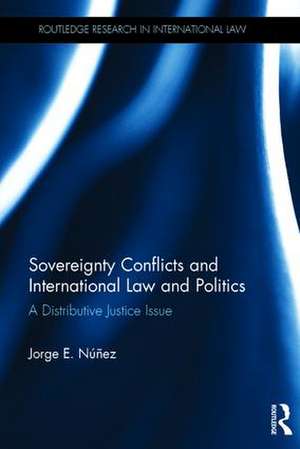Sovereignty Conflicts and International Law and Politics: A Distributive Justice Issue: Routledge Research in International Law
Autor Jorge E. Núñezen Limba Engleză Hardback – 8 mai 2017
| Toate formatele și edițiile | Preț | Express |
|---|---|---|
| Paperback (1) | 416.22 lei 6-8 săpt. | |
| Taylor & Francis – 8 ian 2019 | 416.22 lei 6-8 săpt. | |
| Hardback (1) | 999.64 lei 6-8 săpt. | |
| Taylor & Francis – 8 mai 2017 | 999.64 lei 6-8 săpt. |
Din seria Routledge Research in International Law
-
 Preț: 296.43 lei
Preț: 296.43 lei -
 Preț: 151.73 lei
Preț: 151.73 lei -
 Preț: 311.94 lei
Preț: 311.94 lei -
 Preț: 311.70 lei
Preț: 311.70 lei - 8%
 Preț: 375.14 lei
Preț: 375.14 lei -
 Preț: 281.27 lei
Preț: 281.27 lei - 18%
 Preț: 1053.16 lei
Preț: 1053.16 lei -
 Preț: 484.47 lei
Preț: 484.47 lei -
 Preț: 282.62 lei
Preț: 282.62 lei -
 Preț: 410.50 lei
Preț: 410.50 lei - 18%
 Preț: 1054.75 lei
Preț: 1054.75 lei - 18%
 Preț: 727.38 lei
Preț: 727.38 lei -
 Preț: 422.04 lei
Preț: 422.04 lei - 18%
 Preț: 1054.71 lei
Preț: 1054.71 lei - 18%
 Preț: 1074.44 lei
Preț: 1074.44 lei - 18%
 Preț: 1059.48 lei
Preț: 1059.48 lei - 18%
 Preț: 1060.52 lei
Preț: 1060.52 lei - 18%
 Preț: 1058.43 lei
Preț: 1058.43 lei -
 Preț: 452.27 lei
Preț: 452.27 lei -
 Preț: 451.41 lei
Preț: 451.41 lei -
 Preț: 419.11 lei
Preț: 419.11 lei - 28%
 Preț: 822.34 lei
Preț: 822.34 lei -
 Preț: 494.07 lei
Preț: 494.07 lei - 18%
 Preț: 1118.46 lei
Preț: 1118.46 lei -
 Preț: 491.60 lei
Preț: 491.60 lei -
 Preț: 490.25 lei
Preț: 490.25 lei - 18%
 Preț: 1178.15 lei
Preț: 1178.15 lei -
 Preț: 444.62 lei
Preț: 444.62 lei - 18%
 Preț: 1050.78 lei
Preț: 1050.78 lei -
 Preț: 454.22 lei
Preț: 454.22 lei - 14%
 Preț: 301.05 lei
Preț: 301.05 lei -
 Preț: 419.32 lei
Preț: 419.32 lei - 18%
 Preț: 1052.38 lei
Preț: 1052.38 lei - 18%
 Preț: 1111.87 lei
Preț: 1111.87 lei - 18%
 Preț: 1112.34 lei
Preț: 1112.34 lei - 15%
 Preț: 550.99 lei
Preț: 550.99 lei - 18%
 Preț: 1054.71 lei
Preț: 1054.71 lei -
 Preț: 422.91 lei
Preț: 422.91 lei -
 Preț: 286.51 lei
Preț: 286.51 lei - 18%
 Preț: 1117.88 lei
Preț: 1117.88 lei
Preț: 999.64 lei
Preț vechi: 1219.08 lei
-18% Nou
Puncte Express: 1499
Preț estimativ în valută:
191.34€ • 207.91$ • 160.83£
191.34€ • 207.91$ • 160.83£
Carte tipărită la comandă
Livrare economică 21 aprilie-05 mai
Preluare comenzi: 021 569.72.76
Specificații
ISBN-13: 9781138636842
ISBN-10: 1138636843
Pagini: 198
Ilustrații: 2
Dimensiuni: 156 x 234 x 18 mm
Greutate: 0.44 kg
Ediția:1
Editura: Taylor & Francis
Colecția Routledge
Seria Routledge Research in International Law
Locul publicării:Oxford, United Kingdom
ISBN-10: 1138636843
Pagini: 198
Ilustrații: 2
Dimensiuni: 156 x 234 x 18 mm
Greutate: 0.44 kg
Ediția:1
Editura: Taylor & Francis
Colecția Routledge
Seria Routledge Research in International Law
Locul publicării:Oxford, United Kingdom
Public țintă
Postgraduate and UndergraduateCuprins
Part I 1. Sovereignty Conflicts as a Distributive Justice Dilemma 2. Limited Sovereignty Part II. 3. What Should ‘Shared Sovereignty’ Mean? 4. How far can Sovereign States Cooperate together and Limit their Freedom without Sacrificing their Sovereignty? 5. Why is Shared Sovereignty Desirable? Part III 6. How can Shared Sovereignty be Just? 7. How could Shared Sovereignty work in Practice? 8. Conclusive remarks, implications and limitations
Descriere
Many ongoing conflicts throughout the world can be characterised as sovereignty conflicts in which two States claim exclusive sovereign rights for different reasons over the same piece of land. Drawing on the work of John Rawls this book considers how distributive justice theories can be in tune with the concept of sovereignty and explores the possibility of a solution for sovereignty conflicts based on Rawlsian methodology. Jorge E. Núñez explores a solution of egalitarian shared sovereignty, evaluating what sorts of institutions and arrangements could, and would, best realise shared sovereignty, and how it might be applied to territory, population, government and law.
